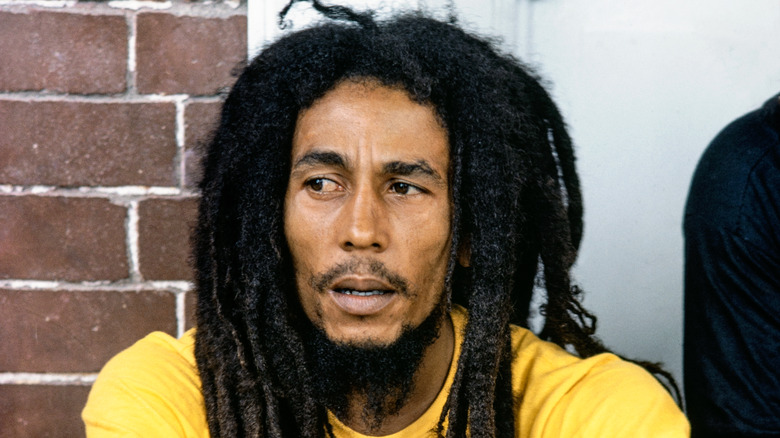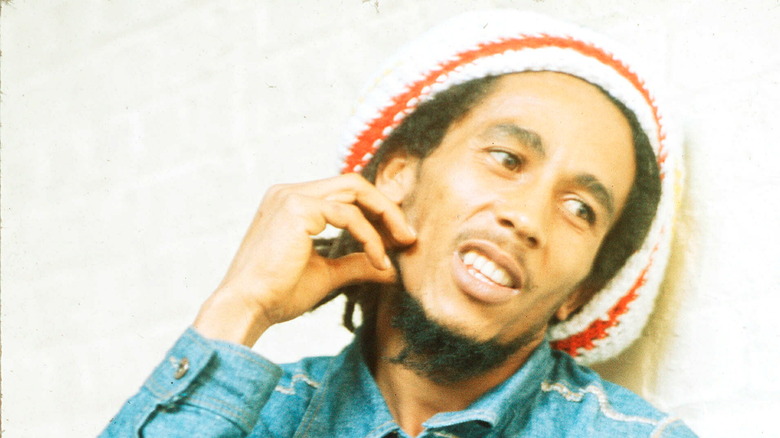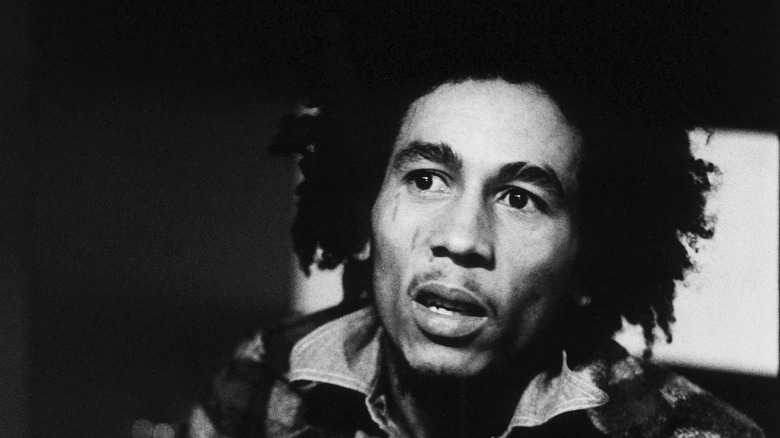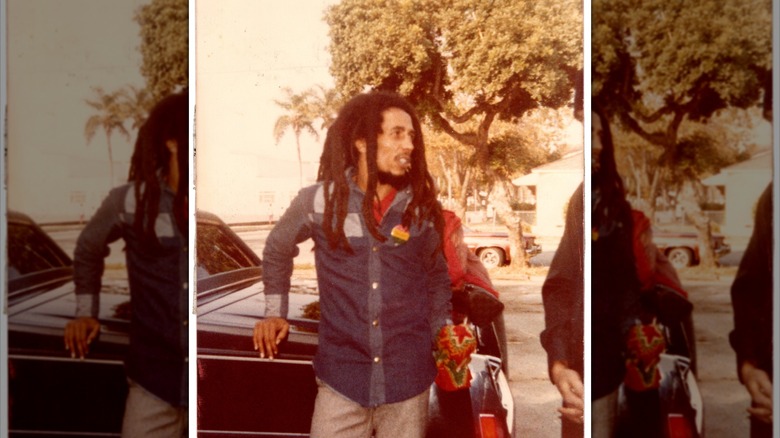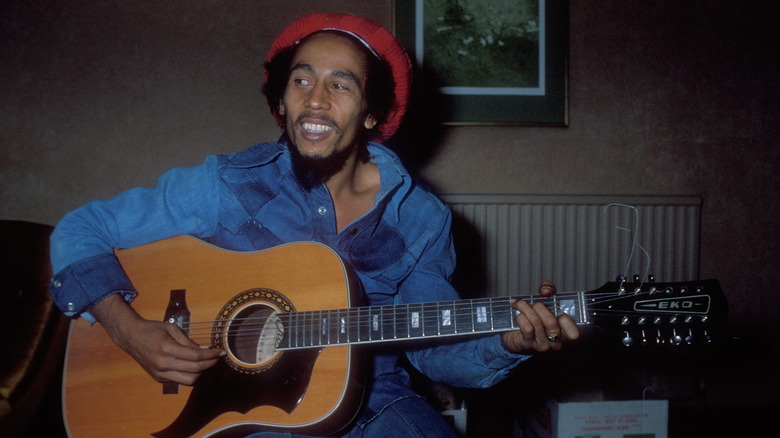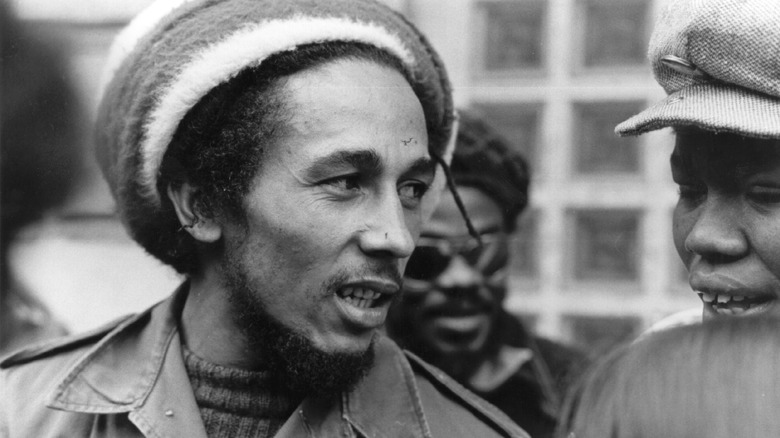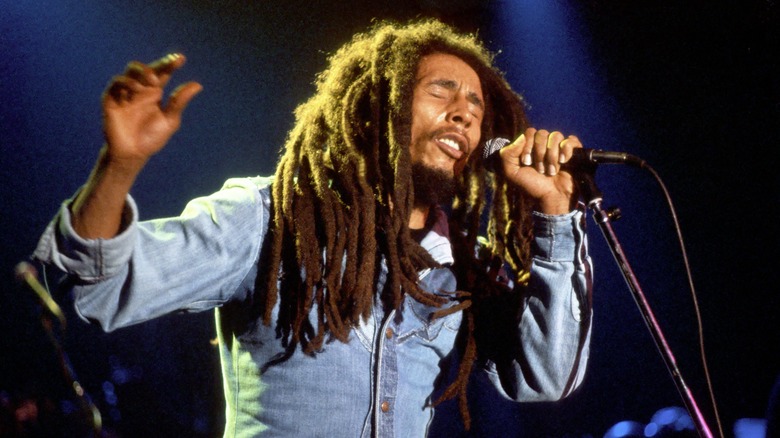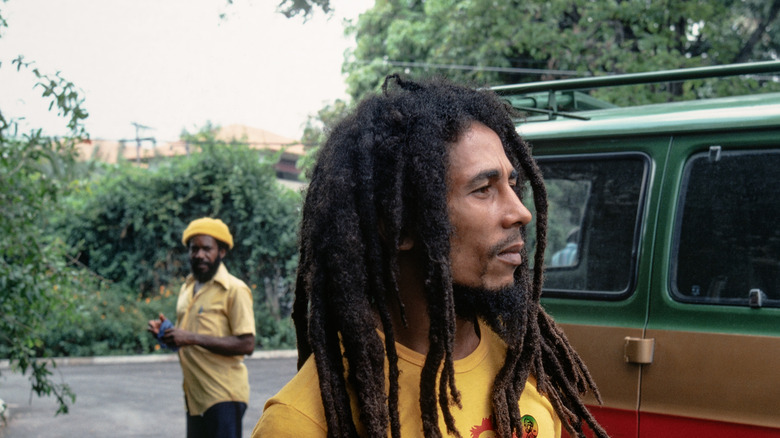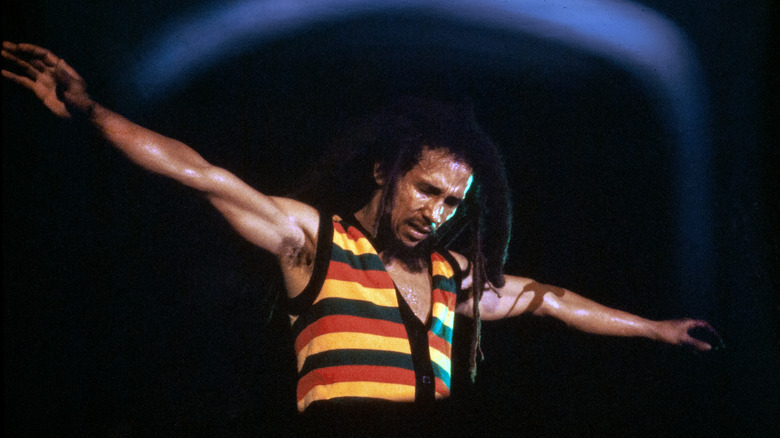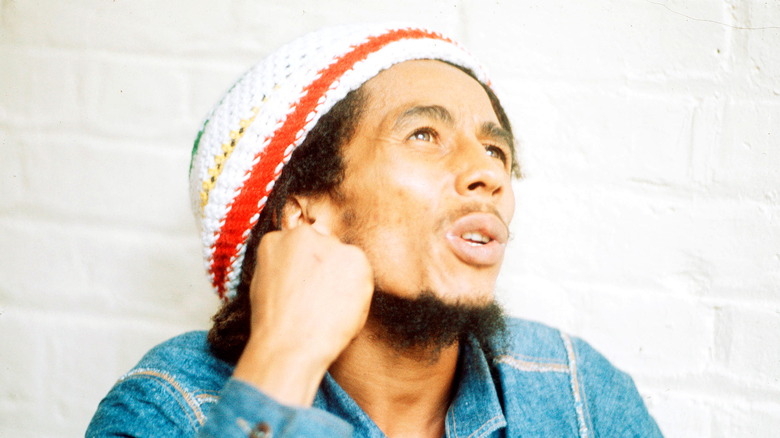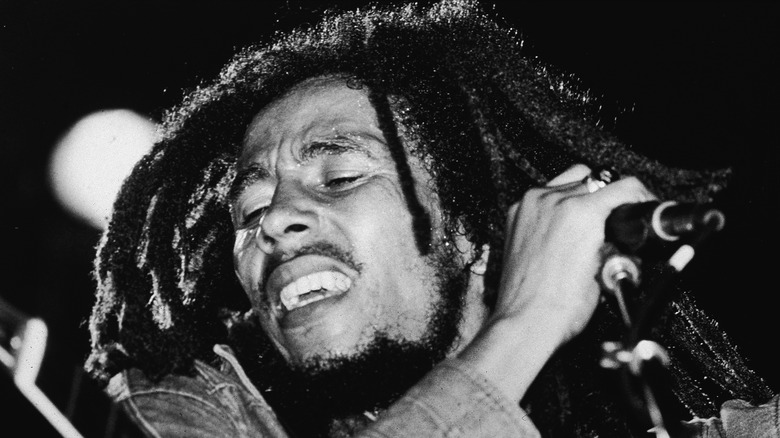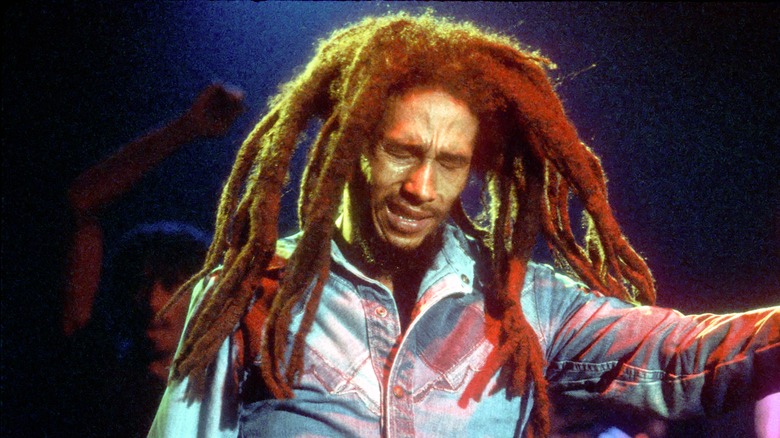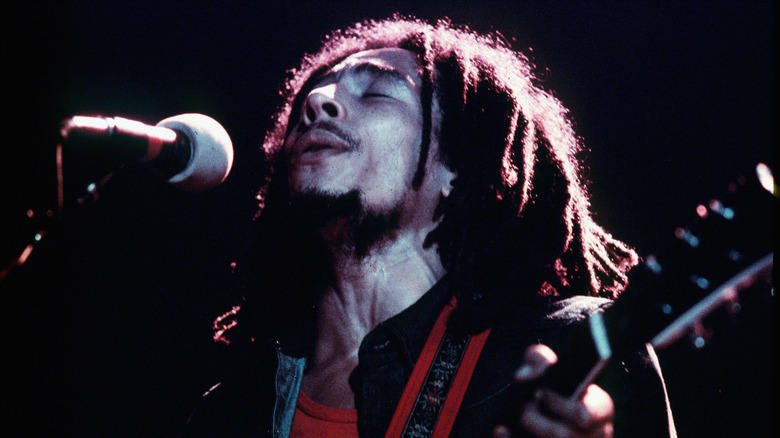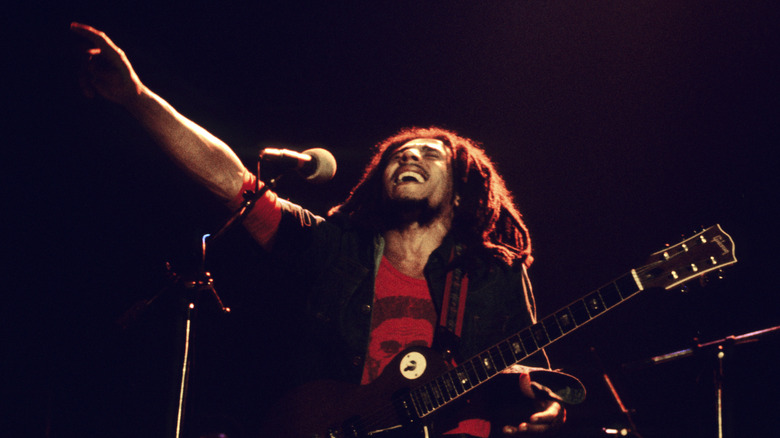Tragic Details About Bob Marley
The mere mention of reggae music evokes the name of one man: Bob Marley, the Jamaican-born singer, songwriter, and guitarist who became the leading figure in the musical genre, ultimately popularizing reggae throughout the world. His hits continue to resonate, with such songs as "One Love," "No Woman No Cry," "Jamming," and numerous others still spreading his message of love and unity.
Marley was a force to be reckoned with; a legendary rock star who sold over 75 million records, he was also a political activist and visionary who achieved success beyond his wildest dreams, and was on the cusp of even greater accomplishments. Sadly, he died in 1981, at the far-too-young age of just 36, leaving behind a legacy that has only grown larger over the years. That's evident in "Africa Unite," a posthumous 2023 album in which some of his greatest hits were reimagined by top Afrobeat artists, along with the stage musical "Get Up Stand Up! The Bob Marley Musical," which made its debut in London's West End in 2021. Meanwhile, his short and influential life came to the screen in early 2024 with the release of "Bob Marley: One Love," a Hollywood biopic in which Marley was portrayed by actor Kingsley Ben-Adir, one of the cast members of the "Barbie" movie.
During his brief time on Earth, this singular artist experienced both unparalleled triumph and devastating tribulations. To learn more, keep reading to explore some tragic details about Bob Marley.
Bob Marley barely knew his father
Bob Marley was born Nesta Robert Marley in 1945 in Nine Mile, a small town situated high in the mountains in Jamaica's St. Ann Parish. His mother, Jamaican native Cedella Booker, was just 18 when she married Marley's father, Norval Sinclair Marley. The elder Marley was not Jamaican, originally hailing from England, and was also significantly older than his wife — aged 60 when they wed. The match wasn't a good one, and Marley's parents separated soon after he was born.
The elder Marley was apparently not cut out for fatherhood; rarely around and displaying little interest in his son, he was absent for much of Bob Marley's childhood. Esther Anderson, who was once Marley's girlfriend, confirmed that Marley's father was, for all intents and purposes, a non-presence in his childhood. "The guy didn't exist," she told BBC News, claiming she only ever saw him in a single photograph. "There was a photograph of him on a horse, a white man on a horse," she said of Marley's father. According to Anderson, Marley rarely spoke about his father; when he did, it was with scorn.
"He provided little financial support and seldom saw her and their son," said Christopher Marley, a member of the white side of Bob Marley's family, in an interview for the book, "So Much Things to Say: The Oral History of Bob Marley." He added, "Norval was seriously unstable, to put it mildly." Norval Marley died in 1955, when his son was just 10.
He grew up the slums of Trench Town
It's not hyperbole to state that Bob Marley is a celebrity who grew up poorer than you thought. In Nine Mile, he and his mother shared a tiny ramshackle dwelling made from scrap wood and corrugated metal. As Bunny Wailer, his bandmate in The Wailers, explained for "So Much Things to Say: The Oral History of Bob Marley," Marley's childhood was a struggle for survival. "His most serious endeavor was just to eat and drink," he said. "There were many nights of cold ground for his bed and rock stone for his pillow. Countless nights."
When Marley was 12, he and his mother moved to Trench Town, the notorious slum within Jamaica's capital city of Kingston. Growing up in those rough streets, Marley was given the nickname Tuff Gong. The moniker, which Marley would later use as the name of his recording studio, was inspired by the Rastafarian religion that he would ultimately embrace. The name was reportedly bestowed on Marley by those who recognized something special about him, indicative of a person who was destined for a unique journey in life.
The rural poverty of Nine Mile was very different from the urban form he encountered in the densely populated slum that housed the poorest citizens of Kingston. Marley himself summed up his experience in the song "Trench Town," in which he sang, "They said, 'Can anything good come out of Trench Town?'"
His biracial heritage led to bullying
The product of a white father and a Black mother, Bob Marley may be one celeb you didn't know was biracial. He grew up feeling unaccepted by either race; he was considered white by his Black peers, and white people considered him to be Black. At school, he was taunted by classmates, who derided him as yellow or "the German boy."
When he reached adolescence, Marley made an effort to reach out to his father's side of the family, in the hopes that he'd find some sort of acceptance from them. He was denied that opportunity when his outreach to his white relatives was firmly rebuffed.
That sense of being an island unto himself, not feeling truly a part of either culture, shaped Marley. Not only did it infuse him with the resilience and self-reliance upon which he'd built his successful career as an entertainer, but it also influenced his inclusive philosophy on race. "I don't have prejudice against meself. My father was a white and my mother was Black. Them call me half-caste or whatever," Marley once said in an interview, as documented in "Marley Legend: An Illustrated Life of Bob Marley." "Me don't dip on nobody's side. Me don't dip on the Black man's side nor the white man's side. Me dip on God's side, the one who create me and cause me to come from Black and white."
He and his wife were shot in an assassination attempt
By 1976, Bob Marley had exploded onto the international music scene, with Eric Clapton's hit cover of "I Shot the Sheriff" pushing both him and reggae music into the mainstream. In December, Marley was back home in Kingston preparing to headline the Smile Jamaica concert — Marley's attempt at establishing national unity in a starkly divided Jamaica during a time of deep political turmoil as battling factions turned the streets into a war zone. Both political parties had approached Marley about giving them his support — he declined both, instead preferring to be a neutral outsider.
This took a near-fatal turn on December 3, when a vehicle came to a stop outside the home that Marley shared with wife Rita and their children. Several armed gunmen poured out and stormed the property, on a mission to assassinate Marley. They entered Marley's home, guns blazing. A bullet grazed his chest, and another lodged in his arm. His wife Rita was shot in the head, but survived.
The would-be assassins were never apprehended, but various theories emerged over the years. One theory posited that the CIA was responsible, in an alleged attempt to destabilize the country after Jamaican leader Michael Manley visited Cuba to meet with communist dictator Fidel Castro. In an undated interview posted to YouTube by Rastafari Coalition, Marley was asked whether the men who shot him were ever brought to justice. "No," he said cryptically, "not by a court or police."
He was forced to flee his beloved Jamaica for exile in London
Despite being wounded in that failed assassination attempt, Bob Marley soldiered on and performed at the politically charged Smile Jamaica concert. The next day, Marley fled to London, where he'd spend the next three years in a self-imposed form of exile due to his belief that his life was in danger if he remained in Jamaica.
He lived in several parts of the city, initially in Chelsea, but also in Bloomsbury, and then Notting Hill. While Marley no doubt missed the tropical warmth of his homeland while living in damp and rainy London, that period was also an intensely creative one for him. His band, The Wailers, joined him in London, where they recorded their blockbuster "Exodus" album.
London was also where several of Marley's illegitimate children were conceived (Marley had way more kids than you might have realized, reportedly acknowledging 11 kids by seven different women). One of these resulted from his affair with Cindy Breakspeare, the Jamaican pageant queen crowned Miss World in 1976. Another alleged affair was with Vogue editor-in-chief Anna Wintour, who reportedly vanished for a week with Marley while on an assignment for Harper's Bazaar (Wintour, however, has denied the claim).
He was arrested for marijuana possession
Bob Marley's association with marijuana has been well documented. Marley didn't consider weed to be a drug, but a holy sacrament within the Rastafarian religion, and was reported to smoke a pound of it each week. "When you smoke herb, herb reveal yourself to you," Marley once said. "All the wickedness you do, the herb reveal itself to yourself, your conscience, show up yourself clear, because herb make you meditate. Is only a natural 'ting and it grow like a tree."
While in London, Marley's prodigious consumption of "herb" did not jibe with the British authorities' stance on marijuana. That was apparent in March 1977, when Marley and The Wailers' bass player, Aston "Family Man" Barrett, were arrested and charged with possession of what was reportedly a small amount of marijuana; Marley was convicted, but managed to avoid jail time by paying a fine.
Interestingly, evidence has subsequently emerged that Marley lied about where he was living when he was arrested, giving cops a fake address so they wouldn't search the place where he was actually staying — which no doubt contained significantly more ganja than he was carrying on his person. London authorities didn't appear to hold a grudge about Marley's weed bust when the home where he lived (which he didn't reveal to police) received one of the city's iconic blue heritage plaques in 2019 to commemorate the fact that Marley slept — and smoked — there.
Even in adulthood, his identity weighed heavy on his mind
The sense of isolation that Bob Marley felt as a biracial child wasn't something that he overcame, but a factor that continued to shape him throughout his life, even in his adult years.
Or at least that's the contention of filmmaker Kevin MacDonald, director of the 2012 biographical documentary "Marley." As MacDonald told The Guardian, Marley didn't like to discuss the fact that his father was white, and hadn't fully reconciled that half of his heritage with the image of himself that he'd built up — and which millions of fans worldwide had embraced. "I was doing some press with [Marley's son] Ziggy Marley the other day, and he said of his father, 'I think Bob always regretted that he wasn't Black,'" MacDonald said. "I wouldn't put it in those bald terms, but I think that was a key to his psychology and to the music. He was always the outsider, and he found a way in his life and music to redeem that fact."
According to MacDonald, being shunned by his father proved to be something of a double-edged sword; while it devastated Marley emotionally, it also lit a fire that fueled him on his journey to superstardom. "He, in fact, proved to the white family, 'I can succeed; you're going to be forgotten, but I'm going to do something,'" MacDonald told Jam Bands. "I think that his father's rejection was part of the reason he was so ambitious."
He was diagnosed with a rare form of cancer
In 1977, Bob Marley noticed a dark spot under his toenail. He initially believed it was an injury he sustained while playing soccer in Paris with a group of journalists, when the steel spike on a soccer cleat punctured his toe. Marley ignored it. However, the spot didn't go away, and over time became a lesion. When Marley eventually visited a doctor, the physician immediately ordered a biopsy. The results led Marley to be diagnosed with acral melanoma, a rare and highly aggressive form of skin cancer.
This particular type of cancer — unlike most forms of melanoma — isn't caused by the sun's ultraviolet radiation, but is actually believed to be the result of genetic factors. Acral melanoma typically begins to form on hairless skin, under a fingernail of toenail (which was the case with Marley), but can also form on the soles of feet or the palms of one's hands. While acral melanoma is rare on an overall basis, it's actually the most common type of melanoma to occur in people of color. Because of the speed at which acral melanoma spreads, it must be treated quickly and aggressively.
He ignored medical advice that could have saved his life
When Bob Marley received his diagnosis of acral melanoma, the doctor recommended that Marley's entire toe be amputated in order to prevent the cancer from spreading. Marley, however, balked at that, and refused amputation. One key reason for that had to do with his religious beliefs, as Rastafarianism considers removing any part of the body to be sinful. In addition, Marley felt that the removal of his toe would cause him to lose his balance, hampering his ability to dance onstage while performing, which could potentially damage his career.
Marley stubbornly refused to accept the doctor's recommendation, and insisted that another route be taken. Instead, he underwent excisional surgery, with the bed of the toe's nail surgically removed, along with the cancerous tissue and additional tissue surrounding the area. He then received a skin graft from his thigh to replace the tissue that had been removed.
In Marley's mind, his health scare had been dealt with. While doctors told him he needed to receive regular checkups to monitor the situation to see if the cancer continued to spread, Marley ignored that advice. Instead, he continued to live his life in London, writing songs, recording and performing, and going on as he always had. Marley looked to the future, not realizing that bigger medical issues for him to deal with were laying ahead.
A collapse while jogging revealed devastating medical news
In the months following his cancer diagnosis and the surgical procedure to address it, Bob Marley embarked on a U.S. tour. He was in New York City when he decided to go for a jog in Central Park. While running, Marley collapsed as a sharp pain hit his neck. After his friend helped him back to the hotel in which they were staying, Marley rested and eventually recovered a few hours later.
The next day, Marley was examined by a neurologist, who had devastating news to share: The cancer in his toe had rapidly spread throughout his body; the neurologist told Marley that he now had a brain tumor. He was given just two weeks to live. "They came in and said, 'Bob, you're in a lot of trouble and you need help immediately,'" Wailers guitarist Al Anderson — who was with Marley when he received the terminal diagnosis — told Relix. "It was like time started moving in the other direction." Danny Sims, who was Marley's manager during that time, told The New Yorker that a doctor from the Memorial Sloan Kettering Cancer Center offered a bleak diagnosis, telling him that Marley had "more cancer in him than I've seen with a live human being."
Marley went on to Pittsburgh, where he delivered a fiery, and now-historic three-hour show, the longest performance he'd ever given. It would also be his final concert ever.
His health deteriorated while seeking alternative treatment for his cancer
After receiving the sad news that his cancer was now terminal and untreatable by traditional western medicine, Bob Marley went to Germany to seek a cure via alternative medicine. He received treatment at a clinic situated in the Bavarian Alps, run by controversial physician Dr. Josef Issels, who had developed a treatment protocol for cancer that focused on using the body's immune system to attack cancer cells, utilizing ultraviolet blood irradiation.
Initially, there was cause for optimism. "In the first months of treatment Bob Marley improved considerably and was again able to play football for fun. This helped, of course, to be optimistic and he also saw other seriously ill patients getting better," wrote Issels' widow Ilse Marie Issels, as reported by Luxury London.
Marley spent eight months at the clinic, and his condition seemingly stabilized. That, however, proved to be temporary, and Marley's condition began deteriorating. Realizing the end was near, Marley embarked on one final journey to return to Jamaica, planning to draw his final breath in the land of his birth.
Bob Marley's touching last words to his son
Bob Marley never reached Jamaica. While flying to Kingston, Marley became deathly sick while on the flight. The plane instead landed in Miami, where Marley was rushed to Cedars of Lebanon Hospital. He died shortly after, at the age of 36.
While Marley was still alive, his wife Rita flew all of the singer's children — some of them hers, some he'd had with other women — and brought them all to Miami so they could say goodbye. While laying on his deathbed, Marley imparted some words of wisdom to his firstborn, Ziggy Marley. "[He said] 'On your way up, take me up. On your way down, don't let me down,'" Marley's son told People. Elaborating on his father's final words, Ziggy explained, "A father-son relationship is very deep, and it's a spiritual thing also. We share a certain spiritual foundation — my father, myself, my brothers and my sisters. So that word means exactly what I'm supposed to be doing, I'm doing. It just means that I don't have to think about it, really, because I was doing it anyway."
Meanwhile, Ziggy Marley also shot down a rumor claiming that the final words his father uttered were, "Money can't buy life." Marley insisted there was no veracity to that at all. "That's not true," he declared.
Bob Marley's death resulted in lawsuits and family infighting
When Bob Marley died in 1981 he left behind numerous children and a musical legacy that endures to this day. What he did not leave, however, was a will. As a result, it was left to his various offspring and family members to sort it all out, which ultimately resulted in a chaotic mishmash of infighting and legal challenges. Marley left behind a fortune of $11.5 million (these days Marley's estate is estimated to bring in more than $25 million per year, making him one of those celebs who made a fortune after dying).
As the Washington Post pointed out, the real benefactors of all the legal wrangling over Marley's estate were the lawyers, who had reportedly received upwards of $4 million in fees while trying to sort out the mess.
Then again, one of Marley's closest friends felt that not making a will may have been deliberate, a way of testing the character of those he left behind. In the 2012 documentary "Marley," Neville Garrick — who designed several of Marley's album covers — said that the fight over Marley's estate forced "everybody [to] reveal who they really were, you get me? Who really did love him, who fighting over the money."
A conspiracy theory about Bob Marley's death refuses to wane
The renewed interest in the life and music of Bob Marley that was generated by the 2024 biopic also caused a long-debunked conspiracy theory about his death to resurface. According to that account, Marley's death was actually an assassination, the result of a covert CIA agent gifting Marley a pair of shoes that had been booby-trapped with a nail that had been (depending upon which version of the conspiracy theory one goes with) made radioactive or coated in carcinogenic bacteria. The reason behind this alleged assassination: Marley's political influence was growing and appeared unstoppable, which the CIA deemed could be detrimental to American interests in the Caribbean.
The dodgy nature of this theory is evident from its source, allegedly coming from the deathbed confession of a CIA agent named Bill Oxley.
That theory continues to find its adherents; rappers Busta Rhymes and T.I. both believe that Marley was murdered by the CIA. However, that claim — which came from a single, unverified story on an obscure website — simply isn't true. USA Today went digging, and could find no record of a Bill Oxley who'd worked for the CIA, while myth-busting websites Snopes and 4News could also find no proof that Oxley existed, let alone confessed to the Marley's murder.

